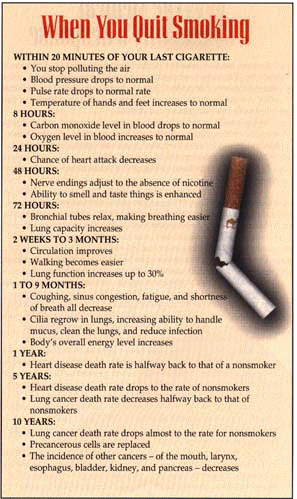


Six stages of change have been conceptualized for a variety of problem behaviors, from weight management to smoking cessation. Before eventually reaching success with any behavior change, we need to progress through these stages. The stages of change are listed below.
Precontemplation is the stage at which there is no intention to change behavior in the foreseeable future. Many individuals in this stage are unaware or under-aware of their problems.
Contemplation is the stage in which people are aware that a problem exists and are seriously thinking about overcoming it but have not yet made a commitment to take action.
Preparation is a stage that combines intention and behavioral criteria. Individuals in this stage are intending to take action in the next month.
Action is the stage in which individuals modify their behavior, experiences, or environment in order to overcome their problems. Action involves the most overt behavioral changes and requires considerable commitment of time and energy.
Maintenance is the stage in which people work to prevent relapse and consolidate the gains attained during action. For addictive behaviors this stage extends from six months to an indeterminate period past the initial action.
Termination is the stage where all temptation is gone, even in the most tempting, difficult times. About 20% of alcoholics and 20% of smokers ever reach this, while lots of people stay in the “maintenance” stage, continuing to focus energy on staying quit.
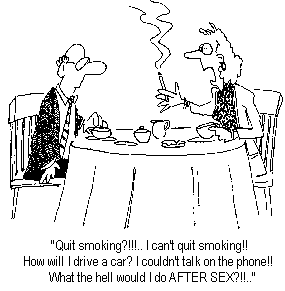
So when someone asks you if you want to quit smoking, or if you’re ever going to, your reply is somewhere between “buzz off” and “got a match?”
Here are some things to think about:
Why do you smoke? What benefit does smoking give you?
Can you think of other ways to meet those needs, and achieve the same benefit?
What might make you want to quit someday?
Do you see yourself smoking forever?
Do you think you are addicted to nicotine? If you are, you will need a
little extra help (i.e. the patch,) when you do decide to quit.
Do you know of the resources that can help? Check out this web site for suggestion of other web sites, or call the American Lung Association 1 800 LUNG USA, or call Student Health Promotion Services 656 0505 to learn of resources available when you want them.
Contemplation
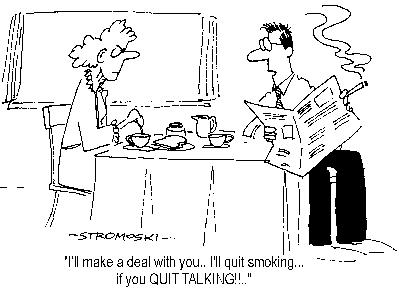
Congratulations, you’re at least thinking you might want to quit. There’s a lot of support out there for you… what will be helpful to you? There are self-help programs, group programs, and pharmaceutical approaches. Ultimately, most people quit on their own, however a support program used in conjunction with the patch can yield a very high success rate. The bottom line is, think about what you need and access the help that fits you!
Some things to think about…
What’s holding you back? Identify sources of ambivalence, they are probably holding you back with that “when in doubt, do nothing” phenomenon. Look at what’s holding you back, see what you can do about them!
Why do you want to quit? Make a LONG and detailed list to help fuel your personal motivation. Talk with others who want to or have quit, share ideas. Focus on the benefits of quitting. Carry your reasons to quit with you. Continue adding to the list. Know the resources available to help you!
Preparation
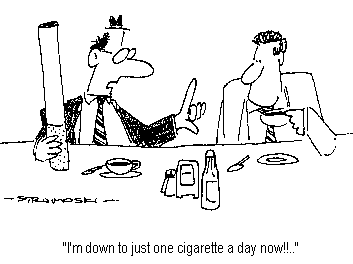
You’re on the run way towards success! This is very exciting. What are your plans? You need a detailed set of plans just as a plane preparing for lift off has specific plans as to what’s going to happen when, and plans for what happens if…. The more prepared you are, the better your chances of success. You do need to know, in decent detail, what needs smoking meet for you. In other words, why do you smoke, and what else could you do to meet those needs. These are what’s called “alternative coping strategies” and the more you have, the better.
Chances are, there’s some fear of failure. That’s normal! And unlike the disaster if the plane falls to the ground, there’s no serious disaster when your successes are intermixed with some days of relapse. The only failure is in abandoning the processes of seeking smoke free success. Remember that quitting is a PROCESS, not an event. So when you get bucked off, climb back on as soon as possible. Quitting smoking can be likened to running a marathon where there will be some second, third and fourth winds (etc!) and there will be some “heartbreak hills” where you’ll need extra support and energy to get though.
Action
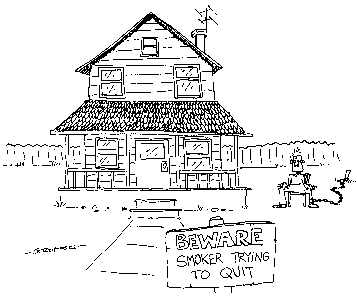
This is it! Your’re on your way! What is working? What’s not working? Use your alternative coping strategies (see preparation) and practice substituting healthy behaviors in place of smoking to meet your needs. Do you smoke to stave off hunger? Drink a lot of water and carry healthy snacks. (37% of people mistake thirst for hunger and overeat when really they just need water!) Do you smoke to manage stress? Try deep breathing (that’s what smoking is after all) better time management, and or some counseling intervention if your stress is too high.
Quitting smoking is not a linear relationship between time and ease of staying quit. There will be good days, (or hours) and there will be horrible days (or hours). These horrible days may be connected to fluctuation in other stress points in your life, hormone shifts, shifts in your physical health (this is why it’s important to take good care of yourself) or random astrological issues. When you have one of these no good horrible days, remember that it will pass, and better days lie ahead. Eventually, and this is a promise, if you stick to quitting, the good days win out.
Exercise, get enough sleep, lean on your friends for support. Above all, avoid HALT… that is: Hunger, Anger, Loneliness, and Tired (not to mention cousins of these states) as these will lower your resistance to tobacco. Also reduce or eliminate your use of alcohol at least for a while (if not permanently) as getting buzzed or more drunk most likely will interfere with success. Use the QUIT TIPS to help give you ideas. How serious are you about this? It takes a serious, determined person to kick smoking because nicotine is a powerfully addictive drug… so gather your resources, reduce your barriers (like HALT, and alcohol, or people who might sabotage your efforts and do this for yourself, for GOOD! Remember that one you quit, you’ll never have to go though the hassle of withdrawal again. So do it right the first time, and then don’t ever have another cigarette. You can do this! Use your resources.
Maintenance
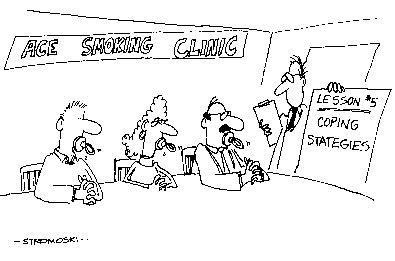
This is the phase you reach when you have been quit for several months at least, and you settle in to “the long haul.” Your start to think of yourself as a non-smoker, and will go for hours and days at a time without thinking about cigarettes. You can exhale here! Yeah! There are cautions however! You are, and will probably always be, addicted to nicotine. The only way to maintain control is to never have “just one.” Many former smokers have described that “oh I’ll just try one…” cigarette as “the kiss of death.” Don’t tempt fate here, don’t try to become a “social smoker” you don’t want to have to go through the drudgery of quitting again! Congratulations are due to you, and keep up the good work! Call on your support systems when you need to … this phase may last indefinitely!
Termination
If you are in this phase, you may not need this web site! (Of course we welcome you for any reason.) According to James Prochaska, Ph.D., creator of these stages of behavior change model, only about 20% of addicts ever make it to this stage, so if you’re wondering if you’ll ever make it out of “maintenance,” you have lots of company. For most former smokers, staying quit is a lifelong effort, just as weight maintenance is a life long effort for some people. If you can say cigarettes no longer tempt you, ever, you are in this stage, in which case, hats off to you, you are exceptional! Help others though the stages!
